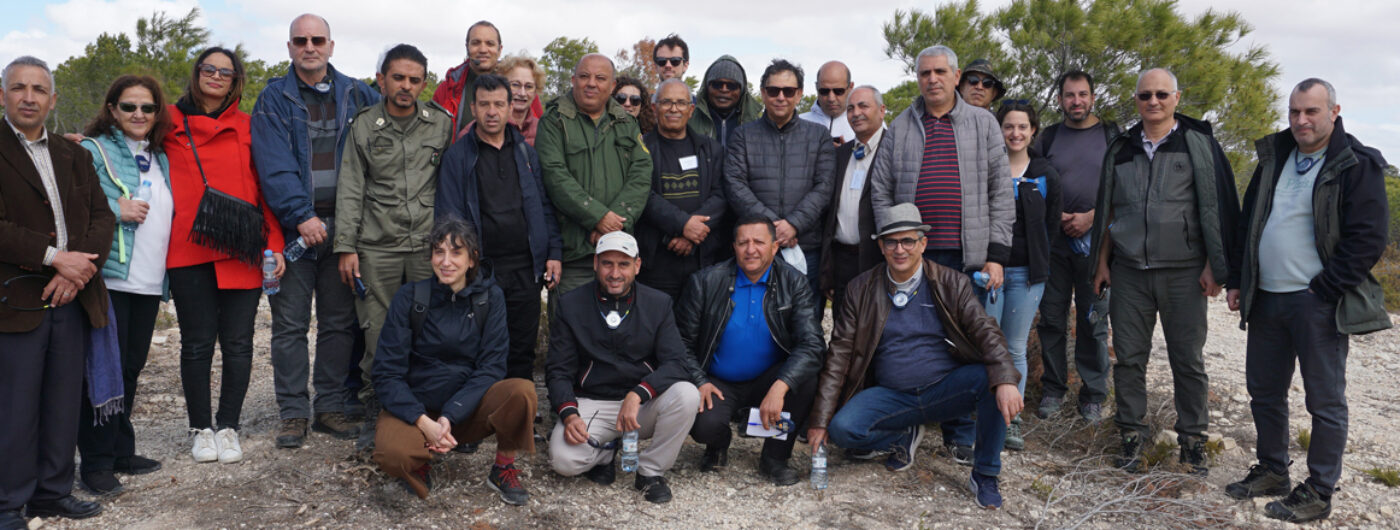
Moving towards integrated management of forests in Tunisia
14-17 March 2023, Tunisia – The Food and Agriculture Organization of the United Nations (FAO), in collaboration with the General Directorate of Forests of Tunisia and with the support of the Union for the Mediterranean, organized between 14-17 March 2023 a regional capacity building workshop for Mediterranean countries on the restoration of degraded forest landscape.
The workshop was part of the Mediterranean regional component of the UfM labelled project “The Paris Agreement in action: scaling up forest and landscape restoration to achieve Nationally Determined Contributions”, funded by the International Climate Initiative (IKI) of the Federal Ministry for Economic Affairs and Climate Action (BMWK).
Despite an increase of 1.8 million hectares of forest between 2010 and 2015, there are 80 million hectares of degraded land – including forests – in the Mediterranean. More than 400,000 hectares of forests are burned every year and at least 16 percent of animal and plant species in Mediterranean forests are threatened with extinction due to global threats such as climate change (FAO and Plan Bleu, 2018). For this reason, it is becoming increasingly urgent for regional and global targets for forest and landscape restoration to properly identify and implement low-cost, long-term strategies, considering that most restoration initiatives involving tree planting are often costly and their application in the region may be limited.
The workshop was oriented towards the sharing of knowledge related to the restoration of degraded Mediterranean forest landscapes, with a focus on the assessment and planning of restoration. Particularly, it addressed the main implications regarding the role of Assisted Natural Regeneration (ANR), a low cost-opportunity to conserve biodiversity and improve ecosystem services, including carbon sequestration and watershed protection. Overall, the regional workshop contributed to the better understanding for participants of the context of Mediterranean forest and landscape restoration, as well as it represented an opportunity to enhance regional dynamics and knowledge sharing.
Alessandra Sensi, UfM Head of Sector for Environment, Green and Blue Economy, recalled that “Restoration will play a fundamental role in the years to come. The IKI project has put in motion a process of critical importance around landscape restoration, which helps Mediterranean countries advancing towards the goals and targets set by COP27 Climate Change and COP15 Biodiversity as well as addressing the priority actions of the UfM GreenerMed Agenda. Through its field activities in the pilot countries and hands-on training at wider Mediterranean level, the project is responding to the rallying call of the UN Decade for Ecosystem Restoration for the protection and revival of ecosystems all around the world, given that only healthy ecosystems can we enhance people’s livelihoods, counteract climate change and reverse biodiversity loss.
The teams and organizations involved in this regional workshop included:
- The FAO Forest and Landscape Restoration Mechanism (FLRM);
- Union for the Mediterranean (UfM);
- FAO Committee on Mediterranean Forestry Questions – Silva Mediterranea ;
- The FAO national office in Tunisia;
- The General Directorate of Forests of Tunisia;
- The International Association for Mediterranean Forests (AIFM);
- Alliance of Bioversity International – CIAT;
- Mediterranean Regional Office of the European Forest Institute (EFIMED);
- The International Union for Conservation of Nature (IUCN)

